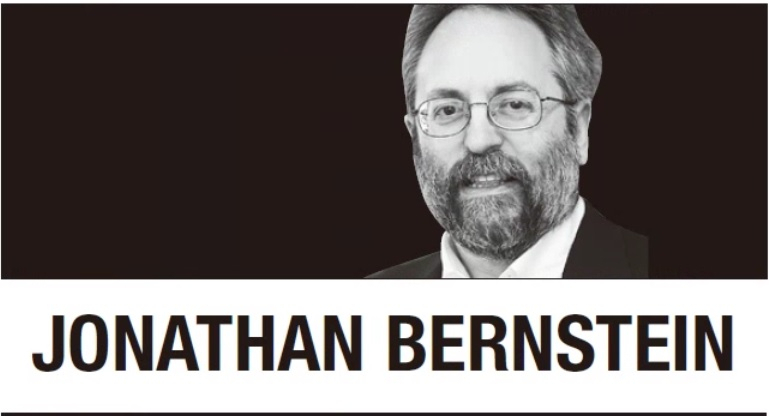[Jonathan Bernstein] Will 3rd parties hurt Biden or Trump?
By Korea HeraldPublished : Dec. 20, 2023 - 05:30

With former Republican Rep. Liz Cheney’s comments that she’s considering an independent bid for president against Donald Trump, experts are beginning to game out how she and other third-party candidates could affect next year’s election.
A political action committee backing independent Robert F. Kennedy Jr.’s campaign announced that it’s planning to spend at least $10 million to get his name on that ballot in 10 states. And the quasi-party No Labels has threatened to recruit a big-name candidate, with retiring Republican Sen. Mitt Romney and retiring Democratic Sen. Joe Manchin getting plenty of buzz. Then you have independent candidate Cornel West and Green Party candidate Jill Stein, who also ran in 2012 and 2016.
There’s still time for more to join the field, with filing deadlines a ways off. As long as President Joe Biden’s approval ratings remain below 40 percent and similarly unpopular Trump remains the Republican front-runner, the race will seem tempting to many. Significant third-party or independent runs generally happen when there’s an unpopular incumbent president eligible to run for reelection: see the candidacies of Ross Perot in 1992, John Anderson in 1980, George Wallace in 1968 and even Teddy Roosevelt in 1912 .
So the question arises about what impact Kennedy, West and the others could have on the race. To begin with, do not expect any of them to win the presidency, or even come close. I’d be surprised if any of them comes close to winning a single state. It’s true that Kennedy is polling relatively well now, ranging from 12 percent to 17 percent of the vote in recent surveys. But there’s a long history of third-party candidates starting strong and then fading.
It’s not impossible to construct a scenario even more favorable to the independent candidate. Biden could be further harmed if the economy turns bad, Trump could be convicted at least once by Election Day, and both are vulnerable to the effects of aging. But the far more likely outcome is that none of them reach 10 percent nationally, or even 5 percent.
However in a close race, 5 percent of the vote is more than enough to potentially tilt the outcome for Biden or Trump, and analysts are already trying to assess which candidate might be harmed. But if they’re looking at public opinion polls to see what voters might do, they’re looking in the wrong place -- at least for now. Most voters have no idea who Liz Cheney and Robert F. Kennedy Jr. are, even given their famous families. That’s even more true for the kinds of swing voters most likely to align with a third-party or independent candidate. That’s because the most attentive voters -- the ones with the highest levels of political information -- are also the most likely to be strong partisans.
The key is what those swing voters will be seeing next September and October when they start paying attention to the election. And that will depend on where and how these candidates campaign.
A candidate who puts resources into Democratic states would likely hurt Biden; one who makes an effort in Republican states hurts Trump. For example, since the electoral college is winner-take-all by state, a candidate who mainly campaigns in Republican Utah would potentially only harm Trump, given that in a two-candidate contest a Republican should easily win there. Cheney, who says she would run only to prevent Trump from regaining the presidency, probably should not even try to qualify for the ballot in Democratic states. For someone like Kennedy, it’s worth watching to see where he allocates resources. That should give a sense of whether he’s more likely to hurt Biden, as the Democratic Party fears. The same is true of any No Labels effort.
But none of these candidates have firm images, ideologically or otherwise, for most voters. And unlike major party candidates, they do not have a party with strong, well-developed positions on public policy, meaning they are free to choose what positions to take and what to emphasize. Kennedy could focus mainly on the very liberal positions he has taken on policies such as climate, which presumably would appeal to those who would otherwise find their way to Biden. Or he could talk mostly about his anti-vaccine stance and other conspiracy theories, which might entice potential Trump supporters. It is too early to know which strategy he’ll choose. As for Cheney, who is strongly anti-abortion, she might maximize her appeal to voters by staking out a moderate position on the issue to woo Democrats who like her pro-democracy record and quest to defeat Trump, and are wary of Biden.
In any case, if you want to know who any candidate might help, ignore the polls now and look for signs of where and how they’re campaigning, once the real campaigning begins. Until then, we’ll just have to wait.
Jonathan Bernstein
Jonathan Bernstein is a Bloomberg Opinion columnist covering politics. -- Ed.
(Tribune Content Agency)
-
Articles by Korea Herald



















![[Today’s K-pop] Treasure to publish magazine for debut anniversary](http://res.heraldm.com/phpwas/restmb_idxmake.php?idx=642&simg=/content/image/2024/07/26/20240726050551_0.jpg&u=)